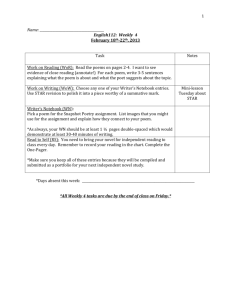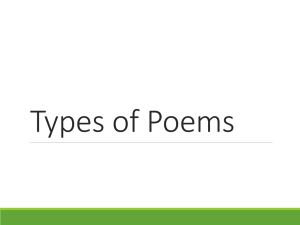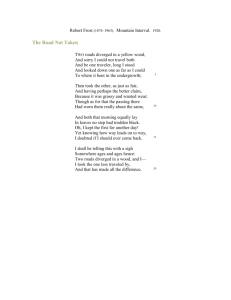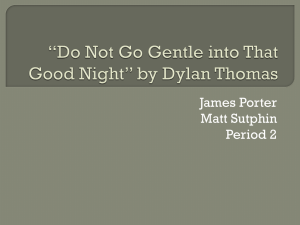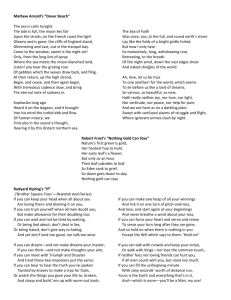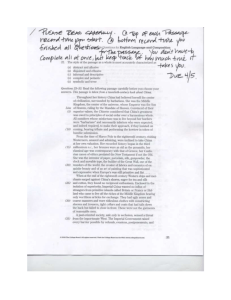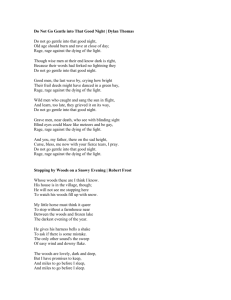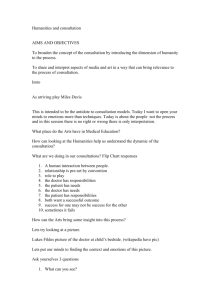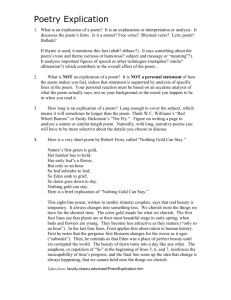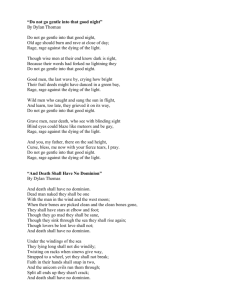poem explication essay assignment sheet
advertisement
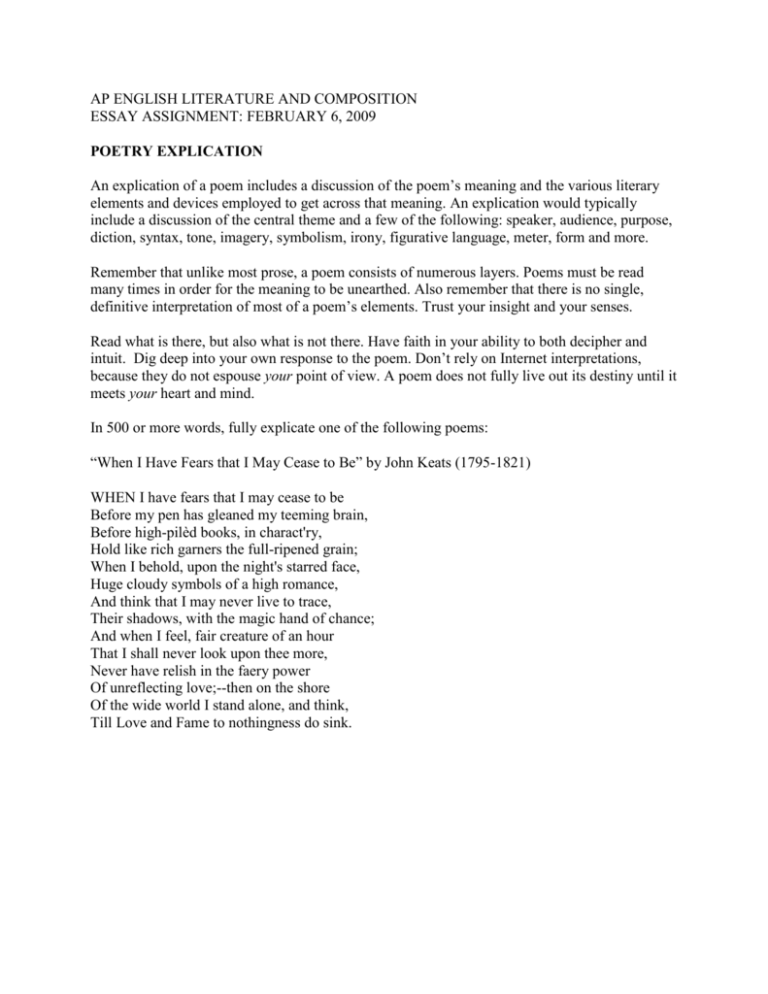
AP ENGLISH LITERATURE AND COMPOSITION ESSAY ASSIGNMENT: FEBRUARY 6, 2009 POETRY EXPLICATION An explication of a poem includes a discussion of the poem’s meaning and the various literary elements and devices employed to get across that meaning. An explication would typically include a discussion of the central theme and a few of the following: speaker, audience, purpose, diction, syntax, tone, imagery, symbolism, irony, figurative language, meter, form and more. Remember that unlike most prose, a poem consists of numerous layers. Poems must be read many times in order for the meaning to be unearthed. Also remember that there is no single, definitive interpretation of most of a poem’s elements. Trust your insight and your senses. Read what is there, but also what is not there. Have faith in your ability to both decipher and intuit. Dig deep into your own response to the poem. Don’t rely on Internet interpretations, because they do not espouse your point of view. A poem does not fully live out its destiny until it meets your heart and mind. In 500 or more words, fully explicate one of the following poems: “When I Have Fears that I May Cease to Be” by John Keats (1795-1821) WHEN I have fears that I may cease to be Before my pen has gleaned my teeming brain, Before high-pilèd books, in charact'ry, Hold like rich garners the full-ripened grain; When I behold, upon the night's starred face, Huge cloudy symbols of a high romance, And think that I may never live to trace, Their shadows, with the magic hand of chance; And when I feel, fair creature of an hour That I shall never look upon thee more, Never have relish in the faery power Of unreflecting love;--then on the shore Of the wide world I stand alone, and think, Till Love and Fame to nothingness do sink. “To a Stranger” by Walt Whitman (1819-1892) Passing stranger! You do not know How longingly I look upon you, You must be he I was seeking, Or she I was seeking (It comes to me as a dream) I have somewhere surely Lived a life of joy with you, All is recall'd as we flit by each other, Fluid, affectionate, chaste, matured, You grew up with me, Were a boy with me or a girl with me, I ate with you and slept with you, your body has become not yours only nor left my body mine only, You give me the pleasure of your eyes, face, flesh as we pass, You take of my beard, breast, hands, in return, I am not to speak to you, I am to think of you when I sit alone or wake at night, alone I am to wait, I do not doubt I am to meet you again I am to see to it that I do not lose you. “The Single Hound” by Emily Dickenson (1830-1886) EXHILARATION is the Breeze That lifts us from the ground, And leaves us in another place Whose statement is not found; Returns us not, but after time We soberly descend, A little newer for the term Upon enchanted ground. “Po’ Boy Blues” by Langston Hughes (1902-1967) When I was home de Sunshine seemed like gold. When I was home de Sunshine seemed like gold. Since I come up North de Whole damn world's turned cold. I was a good boy, Never done no wrong. Yes, I was a good boy, Never done no wrong, But this world is weary An' de road is hard an' long. I fell in love with A gal I thought was kind. Fell in love with A gal I thought was kind. She made me lose ma money An' almost lose ma mind. Weary, weary, Weary early in de morn. Weary, weary, Early, early in de morn. I's so weary I wish I'd never been born. “Do Not Go Gentle into That Good Night” by Dylan Thomas (1914-1953) Do not go gentle into that good night, Old age should burn and rave at close of day; Rage, rage against the dying of the light. Though wise men at their end know dark is right, Because their words had forked no lightning they Do not go gentle into that good night. Good men, the last wave by, crying how bright Their frail deeds might have danced in a green bay, Rage, rage against the dying of the light. Wild men who caught and sang the sun in flight, And learn, too late, they grieved it on its way, Do not go gentle into that good night. Grave men, near death, who see with blinding sight Blind eyes could blaze like meteors and be gay, Rage, rage against the dying of the light. And you, my father, there on the sad height, Curse, bless me now with your fierce tears, I pray. Do not go gentle into that good night. Rage, rage against the dying of the light. “Three Auricled Heart” by Mong-Lan (1970 -- ) http://jacketmagazine.com/13/mong-lan.html
